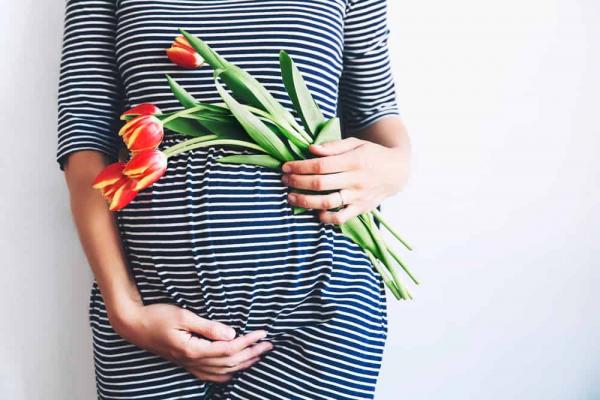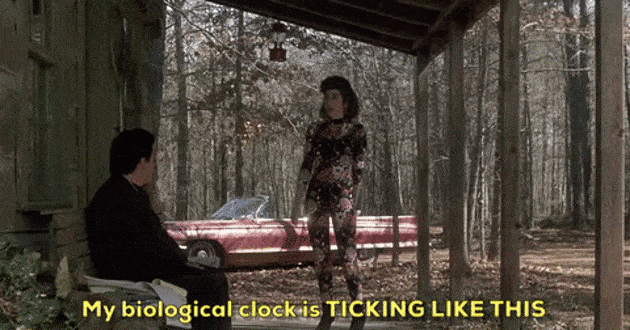
People generally agree that 35 is the age where chances of normal pregnancy start to decrease. While there is some scientific research to back this up, there are also myths perpetuated by pop culture that are simply untrue. Would I have been better off if I had kids while I was still in my 20s? At 35, I'm nearly 20 weeks pregnant with my second child and here's what I've experienced so far ...
Age
My experience
I am four years older and 10 pounds heavier than when I was pregnant with my first child. However, I am still considered a healthy weight with an average BMI, I live a fairly active lifestyle and I eat a relatively healthy diet (except baked treats. I love cookies, what can I say?). I do not suffer from any major health problems or age-related health issues. So far, my pregnancy has been completely normal with no red flags.
What pop culture says
You are too old to have a child once you're over 35.
What science says
It's not necessarily your age that concerns doctors the most, but the medical conditions that can appear as women age. According to Dr Cliff Moore, "If you are in good health, you are more than likely to tolerate pregnancy without a problem."
Biological clock
My experience
When I turned 35 earlier this year, I definitely felt the pressure to hurry up and get pregnant. My age was one of the main factors that influenced my decision to try for another baby. However, I am confident that the pressure I felt had nothing to do with biology and everything to do with how I grew up - living in U.S. culture, the expectation in my religion to have children and watching portrayals of pregnancy in movies and TV shows.
What pop culture says
Your "biological clock" is a real, biological phenomenon that causes women to feel a strong urge have children once they enter their 30s.
What science says
While the concept of a biological clock is real in the context of sleep and circadian rhythms, there is no scientific proof of a biologically based urge in women to have children. The concept of a biological clock represents the ideal fertility window before a woman's ability to have children begins to decline.
Infertility issues
My experience
I got pregnant after only three months of trying with my first child at 31. It took the same amount of time with my second pregnancy at 35. I kept track of my cycle, so I knew roughly when I was ovulating and had no problems conceiving.
What pop culture says
: It's more difficult to get pregnant and there is a higher likelihood of miscarriage once you enter your mid-30s.
What science says
Fertility does decline significantly the older you get, but the decline is more drastic once you enter your 40s. According to the ACOG, at age 40, your chances of conceiving within a year is about 40 to 50 percent, compared to in your 30s, when it's closer 75 percent. By age 43, it goes down to one or two percent. In addition, miscarriage rates significantly increase. At 40, the miscarriage rate is 34 percent, and at 45 it increases to 53 percent.
Genetic screenings
My experience
I got a Panorama Genetic Screening Test done at week nine, based on my midwife's recommendation (It's expensive, so check with your insurance before you do it). It required a simple blood draw that was taken at the same time as other prenatal blood tests I needed. It took about two weeks to get the results, and my baby was low risk in all the areas they tested.
What pop culture says
You have an increased chance of genetic disorders in your baby with increased maternal age.
What science says
As a woman, you are born with all the eggs you will have. As you age, so do your eggs. Older eggs have a higher chance of dividing unequally, which can lead to extra chromosomes in the fetus.
Twins
My experience
Being pregnant with one baby is hard - I can't imagine having two. I have a twin brother, and I was terrified that I would have twins when I got pregnant! I asked the ultrasound tech (more than once) to double-check that there was only one baby in there.
What pop culture says
You are much more likely to have twins as you get older because your body releases multiple eggs in a last-ditch attempt to have babies before your eggs aren't viable any more.
What science says
: Your chances of having twins does increase as you get older. This is because hormonal changes make it more likely for your body to release more than one egg at a time, which means that it's more likely that two eggs could get fertilized. In addition, if you're a twin or if there are twins in your family, you're slightly more likely to have twins yourself. The use of fertility drugs and assisted reproductive technology (ART) also increase the odds of having twins or multiples.
Doctor choice
My experience
I have worked with midwives for both of my pregnancies. I went to a gynecologist for a consultation appointment, and he will be available if complications arise. But as long as everything is normal, I will continue seeing my midwife for my entire pregnancy and birth.
What pop culture says
You are required to see a high risk gynecologist once you are pregnant at age 35 and higher.
What science says
Unless there is a serious medical issue that would require closer monitoring during your pregnancy, you can choose whichever provider you'd like.
The best time to have babies
My experience
I always knew I wanted children, but never felt ready in my 20s and I am glad I waited. I met my husband when I was 27 and we got married when I was 30. I got pregnant when I was 31. After a decade of outdoor adventures, higher education, work experience and world travel, I have better ideas of my goals, values and ideals. I feel much more equipped to be a well-informed, empathetic and adventurous mother for my children than I did in my 20s.
What pop culture says
The best time to have babies is in your mid to late 20s when you're still "young and in shape."
What science says
A recent report by the CDC shows that birth rates among women aged 30 to 34 are now higher than those among women aged 25 to 29 for the first time in 30 years. "Older mothers seem to thrive better," said Tea Trillingsgaard, the co-author of a study on how parenting practices and children's development varied with maternal age. "The mothers have more psychological flexibility, more cognitive flexibility, more ability to tolerate complex emotional stimuli from the children."
So, what's the verdict?
Pregnancy at 35 is not as bad as U.S. culture makes it out to be. But I can only speak for myself. While there are some benefits to waiting until your 30s to have children, it is true that your fertility and ability to get pregnant decreases with age.
Although a lot of potential risks don't necessarily show a significant increase until closer to age 40, it's important to consider your own health and genetic history when deciding when to start or expand your family.
If you do decide to have a baby in your late 30s or early 40s, keep in mind that it will probably be more difficult to conceive on your own. Every pregnancy is different but regardless of your age, experts agree that one of the best ways to help you have a healthy pregnancy is to eat nutritious foods and stay active with regular exercise.


